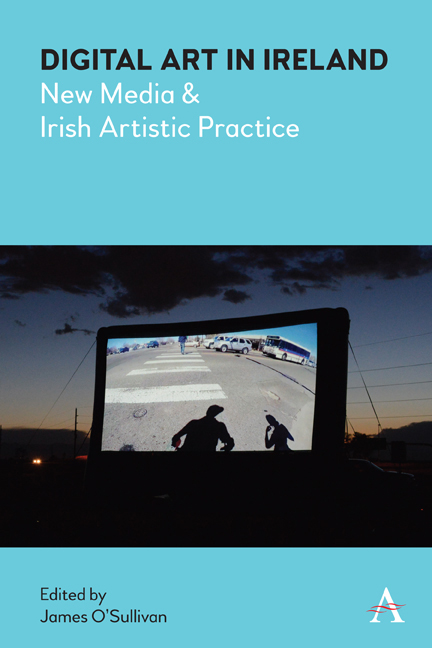Book contents
- Frontmatter
- Dedication
- Contents
- List of Illustrations
- Acknowledgements
- Notes on Contributors
- Chapter 1 Introduction: Digital Art in Ireland
- Chapter 2 Strange Mothers: The Maternal and Contemporary Media Art in Ireland
- Chapter 3 Between Aesthetics and Institutions: Irish Electronic Poetry
- Chapter 4 ‘to shine upon the original all the more fully’: Contemporary New Media Adaptations of James Joyce
- Chapter 5 Art in the Data-City: Critical Data Art in the Age of Surveillance Capitalism
- Chapter 6 Experimental Arcade Video Games as Self-Reflexive Media Art
- Chapter 7 Folding, Unfolding, Refolding Sound Claire Fitch
- Chapter 8 Treacherous Images and Animal Gazes: Ailbhe Ní Bhriain's Reports to an Academy, 2015
- Chapter 9 Pressing Send: Distribution and Curation in Irish New Media Art
- Index
Chapter 2 - Strange Mothers: The Maternal and Contemporary Media Art in Ireland
Published online by Cambridge University Press: 23 February 2022
- Frontmatter
- Dedication
- Contents
- List of Illustrations
- Acknowledgements
- Notes on Contributors
- Chapter 1 Introduction: Digital Art in Ireland
- Chapter 2 Strange Mothers: The Maternal and Contemporary Media Art in Ireland
- Chapter 3 Between Aesthetics and Institutions: Irish Electronic Poetry
- Chapter 4 ‘to shine upon the original all the more fully’: Contemporary New Media Adaptations of James Joyce
- Chapter 5 Art in the Data-City: Critical Data Art in the Age of Surveillance Capitalism
- Chapter 6 Experimental Arcade Video Games as Self-Reflexive Media Art
- Chapter 7 Folding, Unfolding, Refolding Sound Claire Fitch
- Chapter 8 Treacherous Images and Animal Gazes: Ailbhe Ní Bhriain's Reports to an Academy, 2015
- Chapter 9 Pressing Send: Distribution and Curation in Irish New Media Art
- Index
Summary
In Ireland, women's bodies are subjected to particular biopolitical apparatuses surrounding reproduction, enforced through political legislation, religious ideology and national culture. These regulations inform constructions of motherhood in Ireland, with images of the maternal being heavily influenced by the Virgin Mary, Kathleen Ni Houlihan and ‘Mother Ireland’. Certain artists, including Aideen Barry, Laura O’Connor and myself, EL Putnam, use digital technologies as a means of providing alternatives to existing presentations of the Irish maternal, creating artworks that are self-consciously informed by the Irish political and cultural context while taking advantage of formal properties of digital media in order to disrupt these constructions. In these works, the maternal is made strange and uncanny, in Martin Heidegger's sense of the term as a mode of revealing, disrupting visual and aural constructions to exceed representation through the intentional, immanent merging of the performing body with digital technology as an aesthetics of interruption. At the same time, placing emphasis on the maternal subject as one of interruption provides insight into alternative groundings for subjectivity in terms of digital interruption.
Mediated Motherhood
Rosemary Betterton's (2014) art historical analysis of maternal bodies in the visual arts emphasises the complexities of motherhood, which do not simply concern the act of giving birth. In various historical and cultural contexts, motherhood has been mediated on individual and social levels, which in turn has cultivated a precedent for the domination of women's bodies and reproductive functions through biopolitical and ideological controls. For example, in Ireland, where Irish Catholic ideology heavily influenced the formation of the modern nation-state, motherhood was regulated through strict anti-abortion legislation until 2018, continued religious influence on the Irish medical system and constitutional language that describes a woman's major political contributions to the domestic sphere (Bacik 2013; Connolly and O’Toole 2005; Lentin 2013). As Roni Lentin states, ‘In Ireland, the link between birth and nation is palpably obvious in the long history of positioning Irish women as the carriers of the nation's honour and common good’ (2013, 134). Betterton (2014) notes how Christian conceptions of motherhood, particularly the Virgin Mary, present her as a container for the unborn child – something that has been manifest in the embodied experiences of pregnant women of Ireland.
- Type
- Chapter
- Information
- Digital Art in IrelandNew Media and Irish Artistic Practice, pp. 9 - 28Publisher: Anthem PressPrint publication year: 2021



